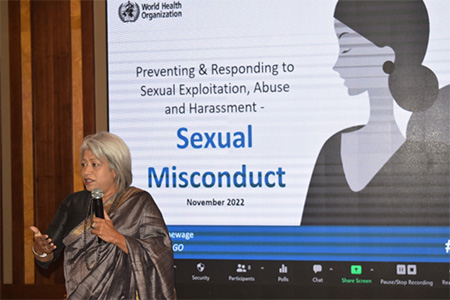 Dr Gaya Gamhewage, Director of PRSEAH at WHO headquartersAs consciousness of the issue of sexual misconduct has risen across WHO, Director of PRSEAH, Gaya Gamhewage, describes the key components that enable this form of misconduct and how the Organization is addressing it.
Dr Gaya Gamhewage, Director of PRSEAH at WHO headquartersAs consciousness of the issue of sexual misconduct has risen across WHO, Director of PRSEAH, Gaya Gamhewage, describes the key components that enable this form of misconduct and how the Organization is addressing it.
Dr Gamhewage points to a lingering fear of reporting due to a perceived lack of consequences for misconduct, a lack of policy clarity and an exploitation of power dynamics as the primary enablers that pave the way for sexual misconduct in the workplace. As a result, many victims and survivors of it feel it is futile to report it or are afraid to do so for fear of retaliation. In order to establish and maintain a culture of courage, Dr Gamhewage stresses the need to first cement a system that backs up the victim and survivors and empowers them, lest they are re-victimized.
People can only be brave if the system backs them up
The responsibility for creating the appropriate blueprint for safeguarding measures against sexual misconduct, and to equip staff with the necessary skills for speaking up, lies with the Organization.
Aside from the compliance requirement for reporting sexual misconduct, Dr Gamhewage emphasizes the need for a whole-of-organization approach that digs deeper, into layers beyond technical knowledge.
This includes focusing attention on conduct and behaviour, adopting a risk-based approach to the reality that sexual exploitation, abuse and harassment can potentially take place in any setting within the boundaries of WHO’s work, and internalizing WHO values.
We practice good behaviour not by intellect, but by being good
Furthermore, safe channels of reporting, scaling up action to assist victims and implementing investigative and disciplinary action, are all factors that will collectively ensure a circle of trust within the Organization.
As an Organization focused on efficiency and results, Dr Gamhewage suggests that additional attention should be paid to behaviour, and that organizational values must be reiterated amongst individuals and teams, referencing the ongoing transformation efforts in this regard. This includes understanding the default positions that can enable harmful behaviour.
Additionally, establishing a focal point network for respectful workplace initiatives in the Region will serve as a core foundation to ensure that the “muscle of good behaviour is grown and to care for others in how we work”.
 Dr Gaya Gamhewage, Director of PRSEAH at WHO headquartersAs consciousness of the issue of sexual misconduct has risen across WHO, Director of PRSEAH, Gaya Gamhewage, describes the key components that enable this form of misconduct and how the Organization is addressing it.
Dr Gaya Gamhewage, Director of PRSEAH at WHO headquartersAs consciousness of the issue of sexual misconduct has risen across WHO, Director of PRSEAH, Gaya Gamhewage, describes the key components that enable this form of misconduct and how the Organization is addressing it.
Dr Gamhewage points to a lingering fear of reporting due to a perceived lack of consequences for misconduct, a lack of policy clarity and an exploitation of power dynamics as the primary enablers that pave the way for sexual misconduct in the workplace. As a result, many victims and survivors of it feel it is futile to report it or are afraid to do so for fear of retaliation. In order to establish and maintain a culture of courage, Dr Gamhewage stresses the need to first cement a system that backs up the victim and survivors and empowers them, lest they are re-victimized.
People can only be brave if the system backs them up
The responsibility for creating the appropriate blueprint for safeguarding measures against sexual misconduct, and to equip staff with the necessary skills for speaking up, lies with the Organization.
Aside from the compliance requirement for reporting sexual misconduct, Dr Gamhewage emphasizes the need for a whole-of-organization approach that digs deeper, into layers beyond technical knowledge.
This includes focusing attention on conduct and behaviour, adopting a risk-based approach to the reality that sexual exploitation, abuse and harassment can potentially take place in any setting within the boundaries of WHO’s work, and internalizing WHO values.
We practice good behaviour not by intellect, but by being good
Furthermore, safe channels of reporting, scaling up action to assist victims and implementing investigative and disciplinary action, are all factors that will collectively ensure a circle of trust within the Organization.
As an Organization focused on efficiency and results, Dr Gamhewage suggests that additional attention should be paid to behaviour, and that organizational values must be reiterated amongst individuals and teams, referencing the ongoing transformation efforts in this regard. This includes understanding the default positions that can enable harmful behaviour.
Additionally, establishing a focal point network for respectful workplace initiatives in the Region will serve as a core foundation to ensure that the “muscle of good behaviour is grown and to care for others in how we work”.
 Dr Gaya Gamhewage, Director of PRSEAH at WHO headquartersAs consciousness of the issue of sexual misconduct has risen across WHO, Director of PRSEAH, Gaya Gamhewage, describes the key components that enable this form of misconduct and how the Organization is addressing it.
Dr Gaya Gamhewage, Director of PRSEAH at WHO headquartersAs consciousness of the issue of sexual misconduct has risen across WHO, Director of PRSEAH, Gaya Gamhewage, describes the key components that enable this form of misconduct and how the Organization is addressing it.








